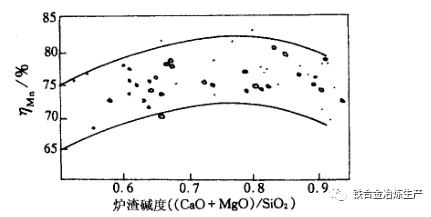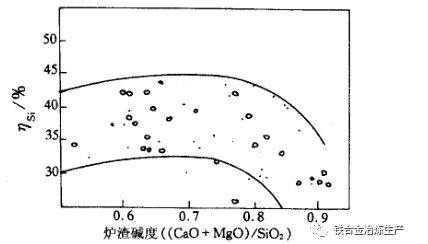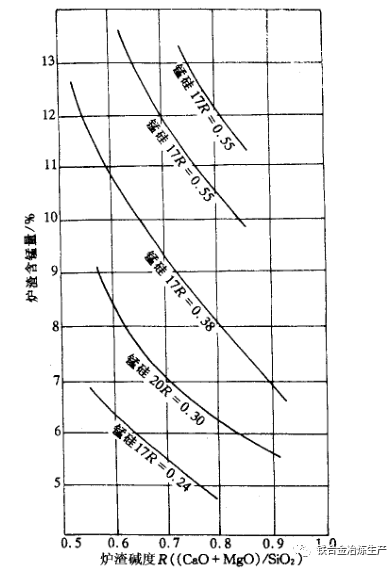paper
effect and influence of slag basicity on furnace condition in silicon manganese smelting
updated: 2022-04-27 attention:
in silicon manganese smelting, both manganese and silicon are reduced from liquid manganese silicate. since sio2 is much more difficult to reduce than mno, when sio2 can be reduced in large quantities, the reduction of mno is also more sufficient.
in order to promote the full reduction of sio2, it is necessary to improve the activity coefficient of sio2. it seems that the lower the basicity of slag, the better; however, when the alkalinity is less than 0.5, although the activity of sio2 is large, the viscosity of slag is also large the mass transfer rate of sio2 in molten liquid is low; the conductivity of slag becomes worse, the temperature gradient in the furnace is large, and the slag liquid temperature in some areas slightly away from the electrode decreases; the temperature required to reduce sio2 is not enough, sio2 reduction is difficult, and the recovery of silicon is reduced; some high melting point substances in viscous slag, such as silicon carbide, accumulate nodules in the furnace and are difficult to discharge out of the furnace. the specific manifestations are as follows: the slag liquid is viscous, it is difficult to discharge the slag out of the furnace, the slag is not discharged completely, the slag is easy to turn over at the furnace mouth, the electric furnace is often under load, the furnace bottom temperature is low, the molten pool is reduced, the melting speed is slowed down, the production efficiency is reduced, the [silicon] in the alloy is low [carbon] high, and the loss of manganese in the slag is increased. adding an appropriate amount of alkaline substances such as lime or dolomite to the charge is conducive to improving the fluidity and conductivity of slag, improving the reduction rate of slag, improving the furnace condition and improving the technical and economic indicators of product smelting. when the alkalinity is less than 0.75, the recovery of manganese increases with the increase of alkalinity, and the recovery of silicon also increases with the increase of alkalinity
high also improved. this shows that increasing the alkalinity within the specified limit can improve the conductivity and fluidity of slag, so that the electric energy transmitted to the furnace can be evenly distributed in a large range, reduce the temperature gradient in the reaction zone in the furnace, which is conducive to accelerating the mass transfer rate of sio2, and will not deteriorate the thermodynamic conditions of sio2 reduction due to the increase of alkalinity and the decrease of sio2 activity. it should be specially pointed out that in order to improve the basicity of slag, it can not be realized only by adding alkaline substances. it is important to improve the reduction rate of sio2. only on the premise of improving the reduction rate of sio2, the amount of manganese running in slag is low. increasing the content of calcium and magnesium in the charge to improve the basicity of the slag often limits the reduction of sio2 and can not improve the recovery of manganese. by increasing the ratio of natural alkalinity in the charge to improve the alkalinity of the slag, the added value is limited. in this case, not only the manganese running of the slag is not low, but also the slag amount increases, and the sio2 activity decreases with the increase of alkalinity. the thermodynamic conditions of sio2 reduction deteriorate seriously, resulting in the rapid reduction of silicon recovery. therefore, in the production of manganese silicon alloy, the higher or appropriate slag alkalinity is achieved by improving the reduction rate of sio2. only when the reduction rate of sio2 is improved, the recovery rate of manganese can be really improved.

1. relationship between manganese recovery rate and slag basicity:

2. relationship between silicon recovery and slag basicity:

3. relationship between slag basicity and manganese content in slag:

when the alkalinity is too high, the slag forming temperature decreases and the temperature in the furnace is not raised. in addition, cao and sio2 combine to form calcium silicate, which makes it difficult to reduce sio2 and the silicon content of the alloy can not go up. in addition, the slag is not easy to be taken away when the slag is too thin, and the slag is not easy to be discharged when the slag is too thin. therefore, too high alkalinity is not good. in production, the basicity of slag is often judged by observing the amount of slag and the fluidity of slag; when the furnace condition is normal, the volume ratio of slag and iron from each furnace is basically the same; if there is more slag and less iron, the alkalinity is high; if the amount of slag is small and cannot flow out, and the slag hangs at the tap hole, it indicates that the alkalinity is low. the fluidity of slag is directly related to alkalinity. when the slag is thin, the alkalinity is high; if the slag is thick, the alkalinity is low. obviously, the factors that determine the basicity of slag are also the amount of coke. due to the influence of many factors, the basicity of slag will change at any time in the smelting process, and there will be insufficient or excess carbon in the same carbon amount, which needs to be adjusted in time. these adjustments must be carried out after comprehensively and accurately judging the furnace condition, because various changing factors of furnace condition affect each other.
for example, when the basicity of slag is low, it may be that the amount of coke is not enough and sio2 cannot be reduced according to the expected proportion, resulting in the low basicity of slag. at this time, the amount of coke should be increased; it may also be due to the low basicity of the slag, the coke particles are wrapped by the viscous slag liquid, and the mass transfer speed in the molten liquid is greatly reduced, which hinders the reduction of sio2. at this time, lime or dolomite should be added.


 wechat
wechat